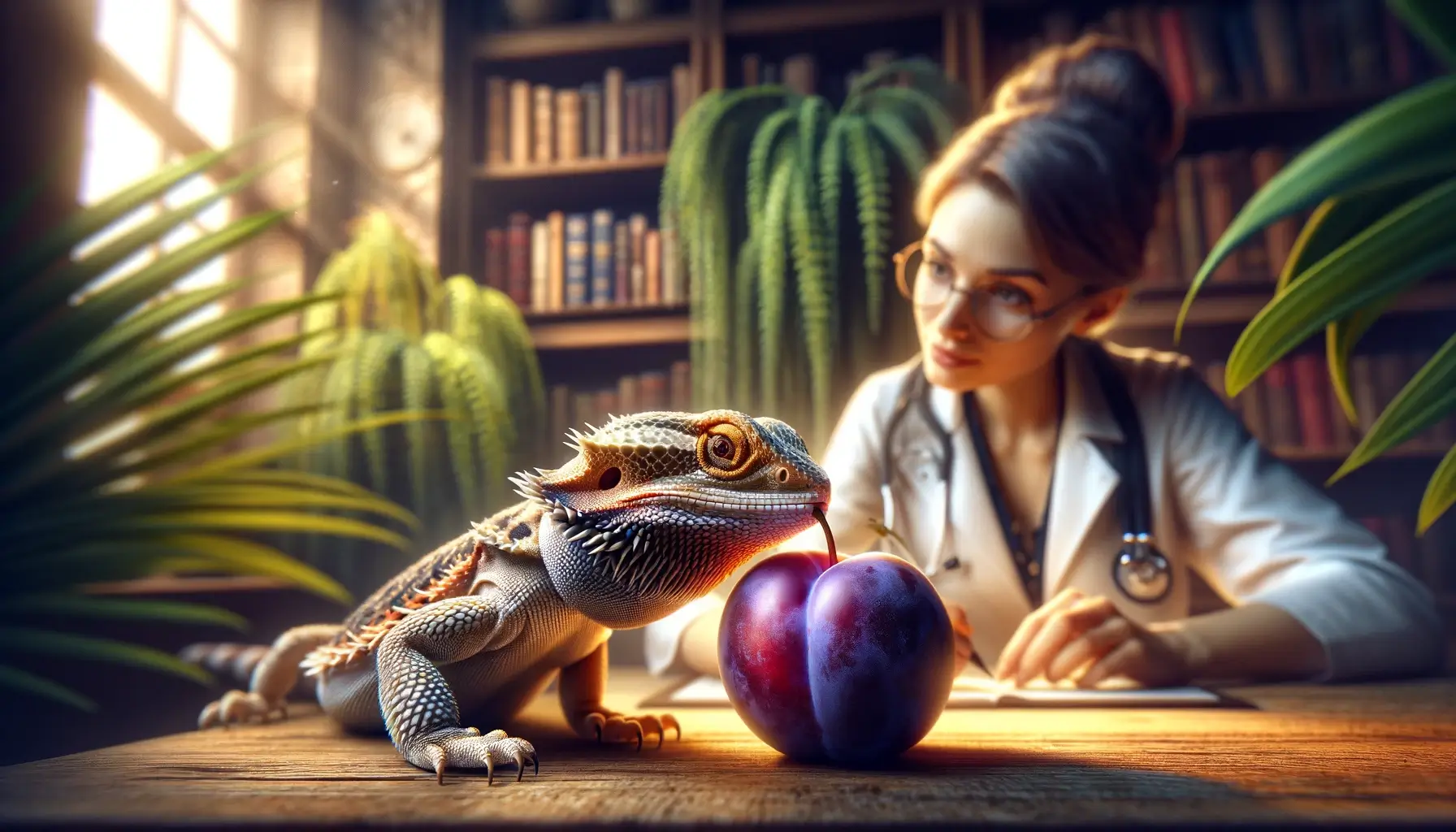Peeling back the layers of your bearded dragon’s diet can often feel like solving a complex puzzle. You’re probably wondering, can they eat plums? It’s not a straightforward yes or no. Plums do offer certain nutritional benefits; however, they also pose potential risks. This is a delicate balance that requires careful consideration. So, should you toss a plum into your pet’s salad mix next time or steer clear? Stay tuned as we deeply explore this complex question, guided by expert Advice.
Nutritional Value of Plums
Brimming with a wide array of essential nutrients, plums offer the advantage of being a low-calorie fruit packed with vitamins and minerals, a dietary bonus you might consider for your bearded dragon. “Can bearded dragons eat plums?” can be answered affirmatively, but with a few important considerations.
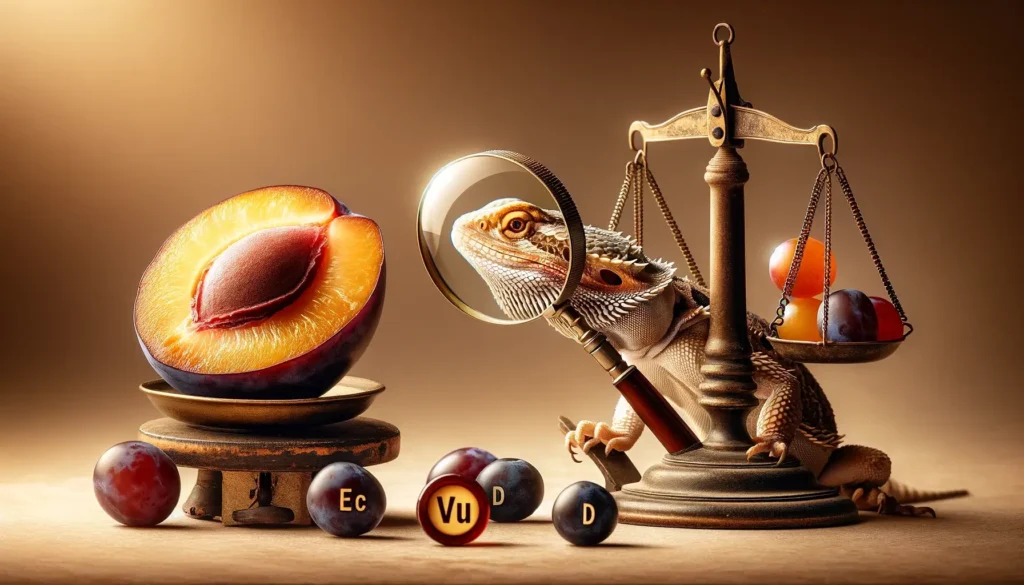
Rich in vitamins C and K, plums also provide good fiber and potassium. These nutrients can help support the overall health of your bearded dragon. When asking, “Can bearded dragons have plums?” you’ll find that they can indeed munch on this nutritious fruit as part of a balanced diet.
The nutritional value of plums can add variety to your bearded dragon’s diet and serve as a tasty snack. You can occasionally integrate plums into your bearded dragon’s meals, ensuring you maintain a balanced nutrition profile.
Risks and Benefits of Plums
While plums can offer numerous nutritional benefits for your bearded dragon, it’s essential also to be aware of potential risks associated with their consumption. Plums are packed with vitamins and fiber to support your pet’s health. However, they’re also high in sugar, which can lead to obesity and other health issues if fed excessively.
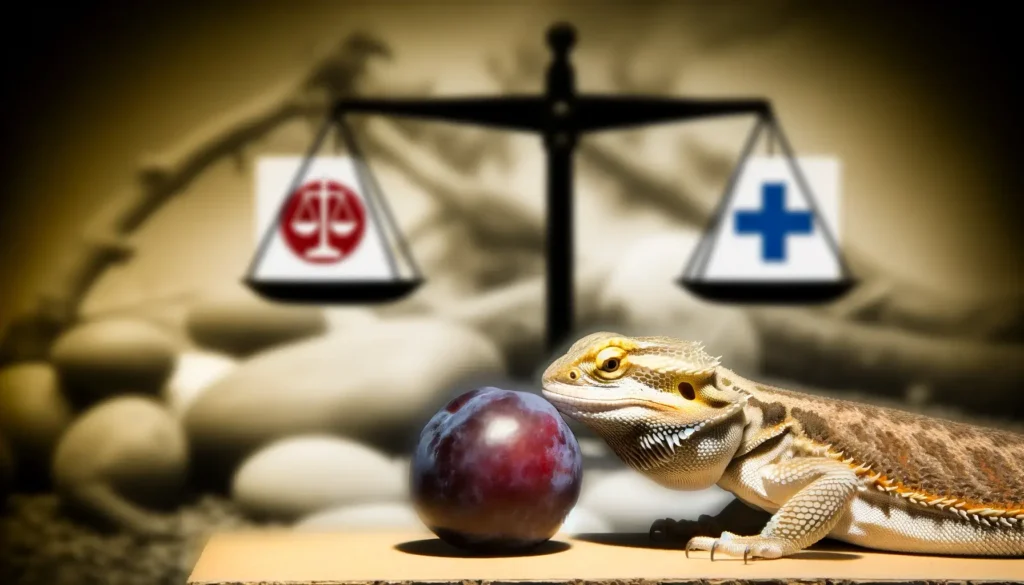
Like plums, raisins, and prunes are other snacks for bearded dragons that should be given in moderation. As dried fruits, they contain concentrated sugars that can be harmful. If you’re asking, “Can bearded dragons eat raisins?” or “Can bearded dragons eat prunes?” the answer is yes, but sparingly.
Pears are another fruit that your bearded dragon can eat. They’re lower in sugar than plums, making them a healthier choice. However, the same rule applies: “Can a bearded dragon eat pears?” is a yes, but in moderation.
Feeding Techniques for Bearded Dragons
When feeding your bearded dragon, it’s crucial to employ the right techniques to ensure a balanced diet and optimal health. Various foods, including fruits, should be part of your pet’s menu, but remember, not all fruits are good for them. For instance, can bearded dragons eat nectarines? Yes, but in moderation, as they have high sugar content.
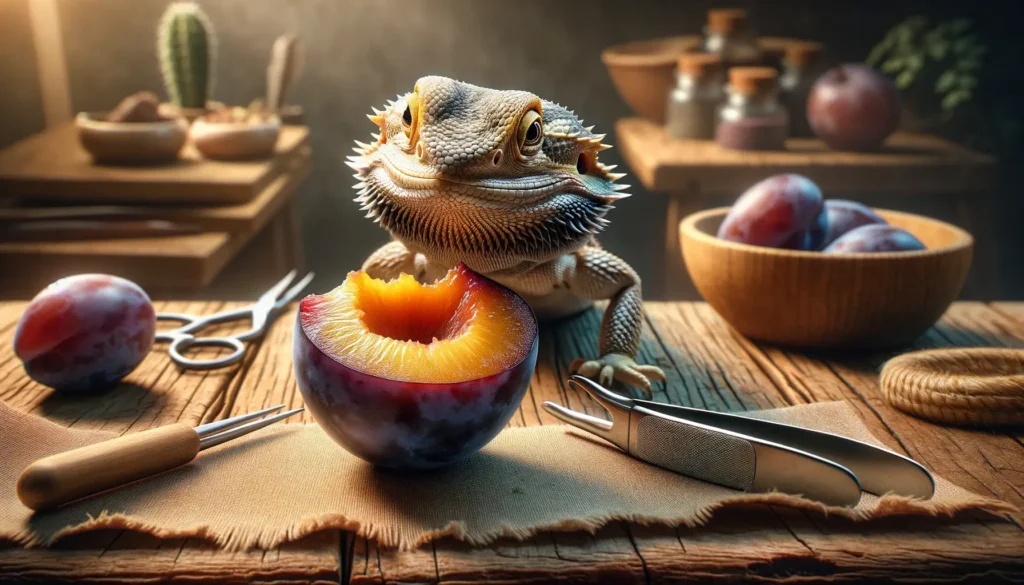
Introduce new foods gradually and monitor your dragon’s reaction. Can bearded dragons eat coconut? They can, but the high-fat content means it should be a rare treat. As for guava and mulberries, your dragon can eat these occasionally, but remember, these fruits have a high sugar content, too.
Bearded dragons have an appetite, but will they overeat? Yes, they can. Hence, portion control is key. Overfeeding can lead to obesity and health issues. Ensure your dragon’s diet primarily consists of vegetables and insects, with fruits as treats.
Fruit Options for Bearded Dragons
Aside from nectarines, coconuts, guavas, and mulberries, there are numerous other fruits you can offer your bearded dragon, each with nutritional considerations.
For example, some owners might wonder, “Can bearded dragons eat persimmons?” They can, but only in moderation due to high sugar content. Similarly, if you’re curious, “Can a bearded dragon eat dragon fruit?” the answer is yes. Dragon fruit is high in fiber and vitamins, making it a beneficial treat.
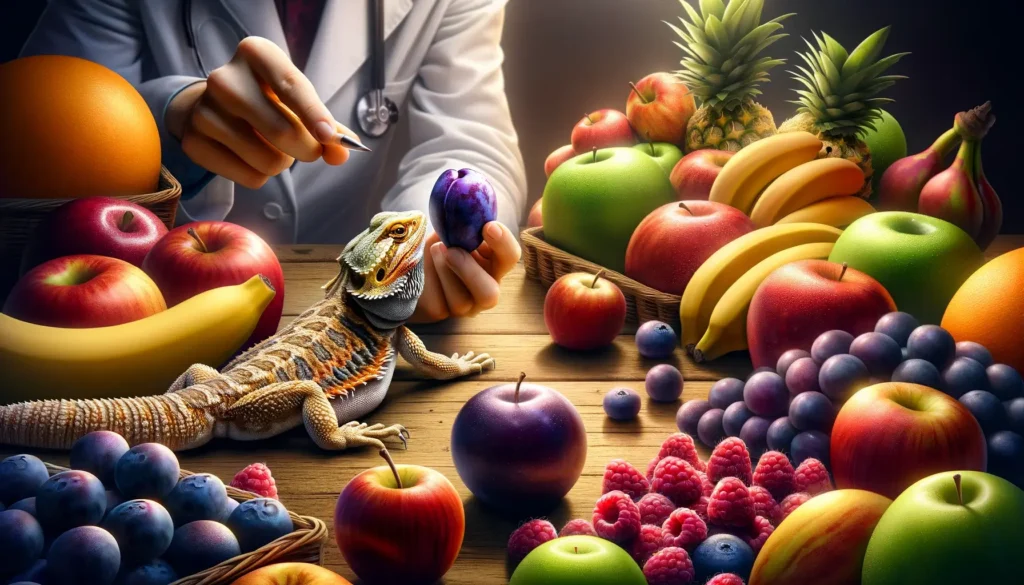
“What about pears, can bearded dragons eat pears?” Absolutely, but again, moderation is key due to the high sugar level. Remember, a balanced diet is crucial for your pet’s health.
The answer to “Can bearded dragons eat cherries?” is a bit more complex regarding cherries. While they can technically eat cherries, the pits must be removed to avoid potential choking hazards. Plus, cherries are high in oxalates, which can lead to health issues.
Lastly, “can bearded dragons have nectarines?” Yes, they can. Nectarines can be a healthy snack, providing hydration and vitamins. However, like all fruits, they should only form a small part of your pet’s diet.
Expert Tips on Bearded Dragon’s Nutrition
To ensure your bearded dragon’s optimal health, it’s vital to understand and implement expert Advice on their nutrition. A balanced diet is key, and while you might wonder, “Can bearded dragons eat popcorn?” or “Can bearded dragons have mint?”, remember that variety and moderation are essential.
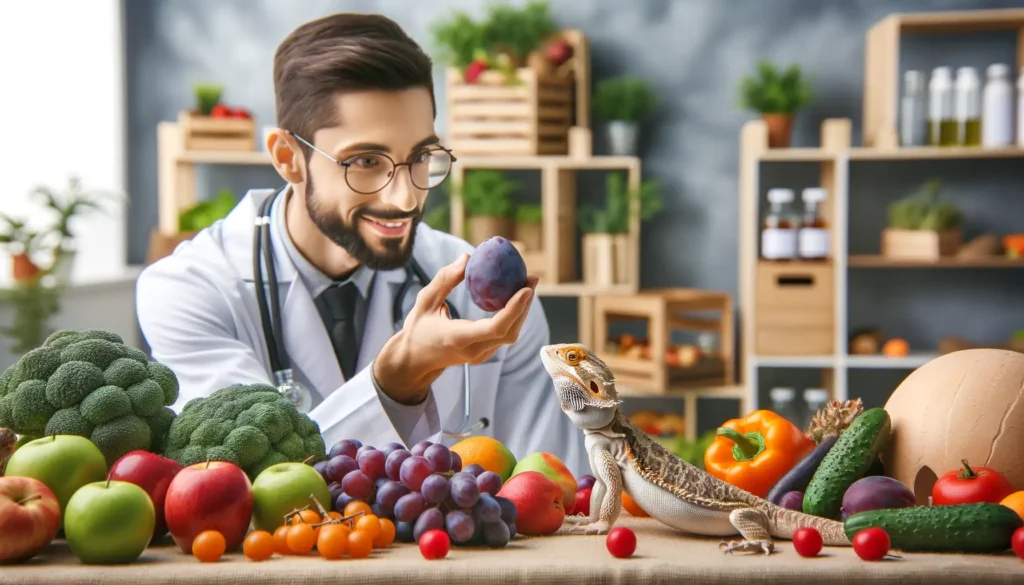
Experts recommend a diet mostly of vegetables and insects sprinkled with occasional fruit treats. Popcorn, however, is a no-go. It lacks nutritional value and can lead to digestion issues. Mint, on the other hand, can be offered, but sparingly. It’s not toxic, yet it doesn’t provide significant nutritional benefits.
Incorporating a fruit like plums, as discussed in ‘Can Bearded Dragons Eat Plums? Expert Advice can be beneficial due to their high water content and vitamin C. However, they should be given as a treat rather than a staple due to their sugar content.
Snacks For Bearded Dragons
Understanding the importance of variety and moderation in your bearded dragon’s diet, you might wonder what kind of snacks can be given to these unique reptiles. You may have heard that other pets, such as hamsters and sugar gliders, can have plums. But how about your bearded dragon?
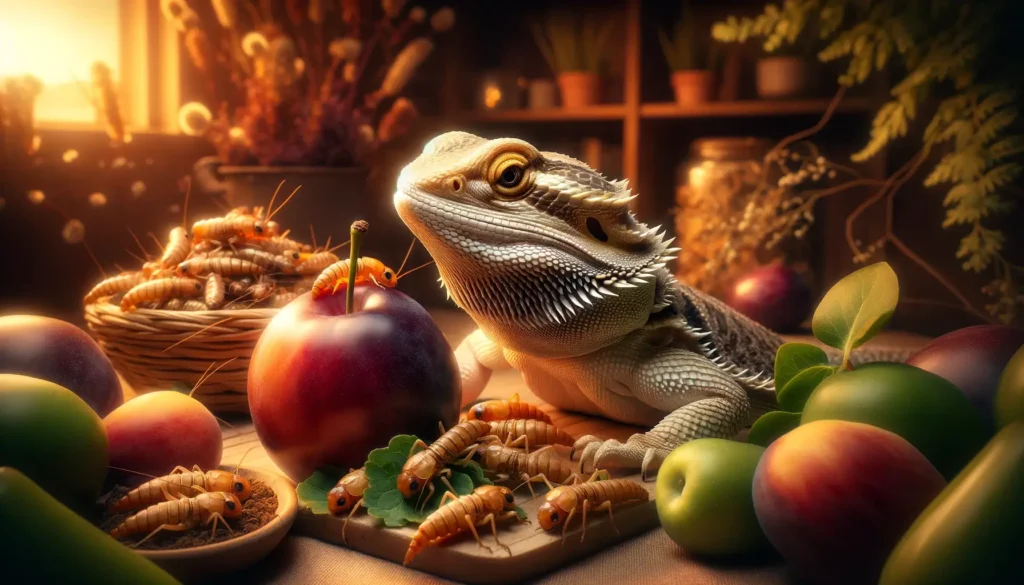
Firstly, it’s essential to note that while hamsters can eat plums in small amounts, not all animals share this characteristic. Sugar gliders, for instance, can also eat plums, but the sugar content can be high, so moderation is vital. Therefore, the question isn’t “Can sugar gliders eat plums?” but “How much can they safely consume?” Similarly, “can hamsters have plums?” is not as simple as it sounds. The same principles apply to your bearded dragon.
When considering snacks for bearded dragons, you should prioritize vegetables, with fruits like plums served sparingly due to their high sugar content. Your dragon’s diet should be balanced and varied, ensuring they receive essential nutrients without overloading on sugars or fats. Remember, what works for hamsters or sugar gliders might not necessarily be the best for your bearded dragon. Always consult a veterinarian or a reptile nutrition expert when in doubt.

